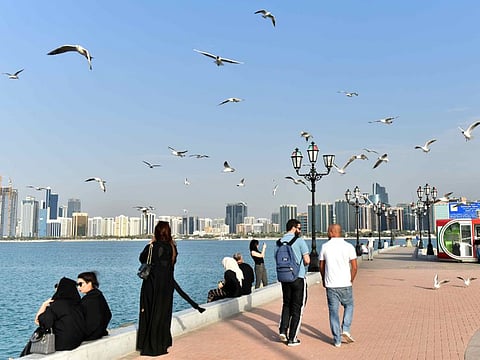Report: UAE among safest countries in the world
Global Terrorism Index 2019 places the country at 130

Abu Dhabi: The UAE is among the countries least impacted countries by terrorism, according to the Global Terrorism Index (GTI) 2019, launched in the capital on Wednesday.
“The UAE is in a very, very good position among the countries least impacted by terrorism. It is ranked 130 among 163 countries around the globe,” said Serge Stroobants, director for Europe and the Mena Region at the Institute for Economics and Peace.
The index, published for the seventh year in a row, ranks 163 countries across the globe according to the relative impact of terrorism. This takes into account the number of terrorist incidents, deaths caused by terror and total value of property damage.
Stroobants said this year’s results saw three Middle East countries: Iraq, Syria and Yemen, retain their position in the top 10 countries most impacted by terrorism. The UAE ranked 130 in this year’s Index, with terrorism impact categorised as ‘very low’.
The UAE is in a very, very good position among the countries least impacted by terrorism. It is ranked 130 among 163 countries around the globeSerge Stroobants, Director for Europe and the Mena Region at the Institute for Economics and Peace
He went on to present the Index’s findings on the broader, global picture, which saw deaths from terrorism fall 15 per cent compared to 2018, noting that 98 countries improved their ranking, compared to 40 deteriorating. This year’s report also saw the Taliban overtake Daesh as the world’s deadliest terror group, accounting for 38 per cent of total global deaths, making Afghanistan the country most affected by terrorism.
Stroobants outlined longer-term trends in global terrorism, with deaths caused by terror down 52 per cent compared to the high point of 2014, which saw Daesh and Boko Haram at their peak. Contrasted to this, however, has been the 320 per cent increase in far-right terrorist incidents in the West, with political ideology the driving force behind an increased proportion of terror motivation.
Mansour Al Mansouri, National Media Council Director General, said, “These findings rightly show the UAE to be one of the world’s safest countries in terms of the terror threat.”
Patterns since 2000
The Index, published annually by the Institute for Economics and Peace, provides a comprehensive summary of the key global trends and patterns in terrorism since 2000. It produces a composite score in order to provide an ordinal ranking of countries on the impact of terrorism.
The Mena recorded a substantial improvement in 2018 with 17 countries improving, while only Iran and Morocco deteriorated. This is the third year in a row that the region has improved. Fatalities in Mena accounted for 42 per cent of the global total deaths from terrorism since 2002. However, since the defeat of ISIL the region’s share of the global total has dropped substantially, and in 2018, it accounted for only 15 per cent of total deaths.
The largest decline in fatalities last year was in Iraq, which had 75 per cent fewer deaths from terrorism in 2018. Syria followed, with nearly a 40 per cent reduction. The principal driver of these improvements was the reduction in attacks perpetrated by ISIL, which fell by 36 per cent in Iraq and 53 per cent in Syria from 2017 to 2018.
In December of 2017, Iraq declared that it had reclaimed the last ISIL territories on the Iraqi-Syrian border and the Russian military announced it had fulfilled its mission of defeating the group in Syria.
Fatality rates
The fatality rate in Iraq per ISIL attack in 2018 fell to 1.6 people per attack, compared to 4.5 people per attack in 2017. More strikingly, in 2018, no attack killed more than 24 people while in 2017, 28 attacks resulted in 25 or more fatalities. The number of active groups in the country also fell from 12 to eight. Conversely, in Syria in 2018, while there were fewer attacks overall, there were more active terror groups in the country and attacks by ISIL, while less frequent, these attacks were deadlier than in 2017. The number of active terrorist groups in 2018 increased to 14, compared to only eight in the prior year. Sixty per cent of attacks were attributed to these groups, while 40 per cent were not claimed in 2018. The number of attacks by ISIL declined substantially, falling from 64 to 30, but the fatality rate of these attacks rose from 10.8 to 16 in 2018, a 48 per cent increase when compared to the prior year.
Lebanon, Bahrain, Kuwait, Egypt and Iraq had the largest improvements in scores in the region. Terror attacks in Lebanon have fallen consistently since peaking in 2014, with only two deaths from five incidents recorded in 2018. In 2018, Lebanon did not record a single attack by ISIL, the first year since 2013. Bahrain recorded one attack in 2018, down from 18 in 2017, while Kuwait has not recorded a single terrorist attack in the past two years. Egypt saw the number of terror attacks fall from 169 to 45, as a result of increased counter-terrorism activities directed at the Sinai Province of the Islamic State. Morocco and Iran were the only two Mena countries to deteriorate in 2018. Morocco experienced one terrorist attack last year, its first since 2015. Two tourists were killed by Jihadi-inspired extremists who pledged allegiance to ISIL in a video. Previously ISIL had not been present in Morocco.
10 countries most impacted by terrorism
Sign up for the Daily Briefing
Get the latest news and updates straight to your inbox



